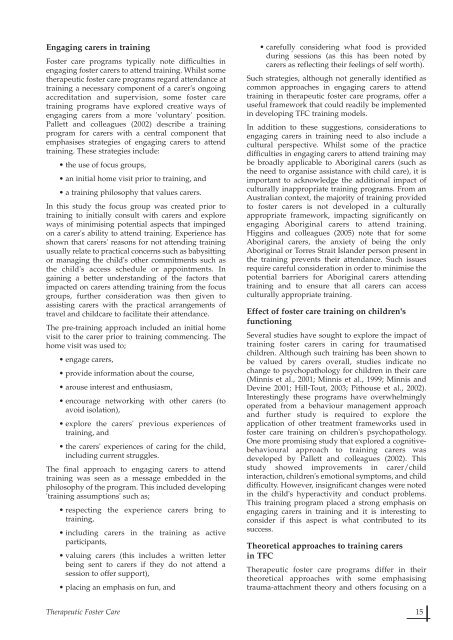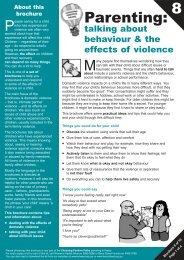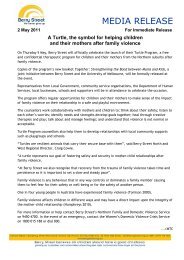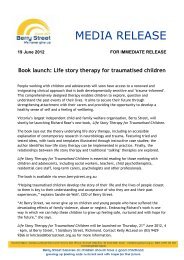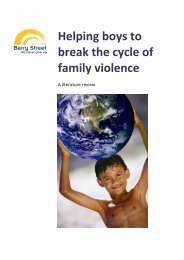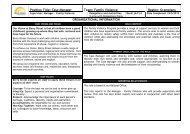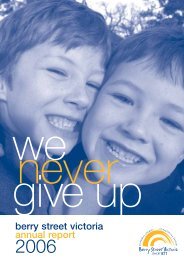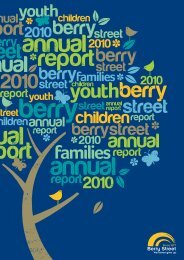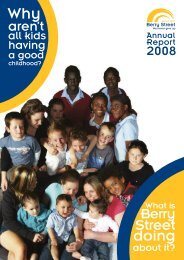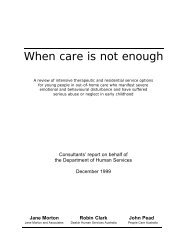Therapeutic foster care - Berry Street Childhood Institute
Therapeutic foster care - Berry Street Childhood Institute
Therapeutic foster care - Berry Street Childhood Institute
Create successful ePaper yourself
Turn your PDF publications into a flip-book with our unique Google optimized e-Paper software.
Engaging <strong>care</strong>rs in training<br />
Foster <strong>care</strong> programs typically note difficulties in<br />
engaging <strong>foster</strong> <strong>care</strong>rs to attend training. Whilst some<br />
therapeutic <strong>foster</strong> <strong>care</strong> programs regard attendance at<br />
training a necessary component of a <strong>care</strong>r's ongoing<br />
accreditation and supervision, some <strong>foster</strong> <strong>care</strong><br />
training programs have explored creative ways of<br />
engaging <strong>care</strong>rs from a more 'voluntary' position.<br />
Pallett and colleagues (2002) describe a training<br />
program for <strong>care</strong>rs with a central component that<br />
emphasises strategies of engaging <strong>care</strong>rs to attend<br />
training. These strategies include:<br />
• the use of focus groups,<br />
• an initial home visit prior to training, and<br />
• a training philosophy that values <strong>care</strong>rs.<br />
In this study the focus group was created prior to<br />
training to initially consult with <strong>care</strong>rs and explore<br />
ways of minimising potential aspects that impinged<br />
on a <strong>care</strong>r's ability to attend training. Experience has<br />
shown that <strong>care</strong>rs' reasons for not attending training<br />
usually relate to practical concerns such as babysitting<br />
or managing the child's other commitments such as<br />
the child's access schedule or appointments. In<br />
gaining a better understanding of the factors that<br />
impacted on <strong>care</strong>rs attending training from the focus<br />
groups, further consideration was then given to<br />
assisting <strong>care</strong>rs with the practical arrangements of<br />
travel and child<strong>care</strong> to facilitate their attendance.<br />
The pre-training approach included an initial home<br />
visit to the <strong>care</strong>r prior to training commencing. The<br />
home visit was used to;<br />
• engage <strong>care</strong>rs,<br />
• provide information about the course,<br />
• arouse interest and enthusiasm,<br />
• encourage networking with other <strong>care</strong>rs (to<br />
avoid isolation),<br />
• explore the <strong>care</strong>rs' previous experiences of<br />
training, and<br />
• the <strong>care</strong>rs' experiences of caring for the child,<br />
including current struggles.<br />
The final approach to engaging <strong>care</strong>rs to attend<br />
training was seen as a message embedded in the<br />
philosophy of the program. This included developing<br />
'training assumptions' such as;<br />
• respecting the experience <strong>care</strong>rs bring to<br />
training,<br />
• including <strong>care</strong>rs in the training as active<br />
participants,<br />
• valuing <strong>care</strong>rs (this includes a written letter<br />
being sent to <strong>care</strong>rs if they do not attend a<br />
session to offer support),<br />
• placing an emphasis on fun, and<br />
• <strong>care</strong>fully considering what food is provided<br />
during sessions (as this has been noted by<br />
<strong>care</strong>rs as reflecting their feelings of self worth).<br />
Such strategies, although not generally identified as<br />
common approaches in engaging <strong>care</strong>rs to attend<br />
training in therapeutic <strong>foster</strong> <strong>care</strong> programs, offer a<br />
useful framework that could readily be implemented<br />
in developing TFC training models.<br />
In addition to these suggestions, considerations to<br />
engaging <strong>care</strong>rs in training need to also include a<br />
cultural perspective. Whilst some of the practice<br />
difficulties in engaging <strong>care</strong>rs to attend training may<br />
be broadly applicable to Aboriginal <strong>care</strong>rs (such as<br />
the need to organise assistance with child <strong>care</strong>), it is<br />
important to acknowledge the additional impact of<br />
culturally inappropriate training programs. From an<br />
Australian context, the majority of training provided<br />
to <strong>foster</strong> <strong>care</strong>rs is not developed in a culturally<br />
appropriate framework, impacting significantly on<br />
engaging Aboriginal <strong>care</strong>rs to attend training.<br />
Higgins and colleagues (2005) note that for some<br />
Aboriginal <strong>care</strong>rs, the anxiety of being the only<br />
Aboriginal or Torres Strait Islander person present in<br />
the training prevents their attendance. Such issues<br />
require <strong>care</strong>ful consideration in order to minimise the<br />
potential barriers for Aboriginal <strong>care</strong>rs attending<br />
training and to ensure that all <strong>care</strong>rs can access<br />
culturally appropriate training.<br />
Effect of <strong>foster</strong> <strong>care</strong> training on children's<br />
functioning<br />
Several studies have sought to explore the impact of<br />
training <strong>foster</strong> <strong>care</strong>rs in caring for traumatised<br />
children. Although such training has been shown to<br />
be valued by <strong>care</strong>rs overall, studies indicate no<br />
change to psychopathology for children in their <strong>care</strong><br />
(Minnis et al., 2001; Minnis et al., 1999; Minnis and<br />
Devine 2001; Hill-Tout, 2003; Pithouse et al., 2002).<br />
Interestingly these programs have overwhelmingly<br />
operated from a behaviour management approach<br />
and further study is required to explore the<br />
application of other treatment frameworks used in<br />
<strong>foster</strong> <strong>care</strong> training on children's psychopathology.<br />
One more promising study that explored a cognitivebehavioural<br />
approach to training <strong>care</strong>rs was<br />
developed by Pallett and colleagues (2002). This<br />
study showed improvements in <strong>care</strong>r/child<br />
interaction, children's emotional symptoms, and child<br />
difficulty. However, insignificant changes were noted<br />
in the child's hyperactivity and conduct problems.<br />
This training program placed a strong emphasis on<br />
engaging <strong>care</strong>rs in training and it is interesting to<br />
consider if this aspect is what contributed to its<br />
success.<br />
Theoretical approaches to training <strong>care</strong>rs<br />
in TFC<br />
<strong>Therapeutic</strong> <strong>foster</strong> <strong>care</strong> programs differ in their<br />
theoretical approaches with some emphasising<br />
trauma-attachment theory and others focusing on a<br />
<strong>Therapeutic</strong> Foster Care 15


